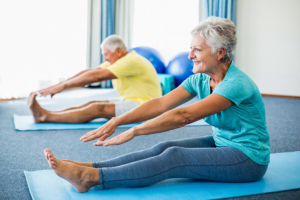Think twice before skipping out on that much-needed workout because, according to a number of studies, exercise is key to a healthy brain.
We already know that physical exercise does wonders for your body. Still, its benefits actually go beyond looking good and feeling great. It not only keeps you in shape, but it also benefits the most crucial organ in your body—the brain!
Studies suggest that regular exercise, even low-impact ones, helps keep the brain’s cognitive functions sharp and intact. In fact, a 20-minute aerobic workout already increases the brain’s memory function and information processing.
More importantly, it tames down the symptoms of Alzheimer’s disease and dementia, which are both debilitating illnesses that target older people.
Brain health in seniors is especially significant as they reach their prime years. As you age, your body and brain age as well, becoming more prone to deterioration and brain-related illnesses.
Yes, nobody stands a chance against aging. Still, it is possible to counter and prevent its mental effects by doing healthy activities such as exercising.
Now let us dig deeper and learn how exercise impacts the brain’s health.
Benefits of Exercise to Brain Health
- Enhances Learning and Memory Skills
Exercise is a multifaceted activity that positively influences the brain, especially in its memory and learning abilities.
During an exercise, as your heart beats faster, it also pumps blood and oxygen to the brain in a quick manner. Thus, activating the brain cells and stimulating brain activity.
Further, studies have shown that it directly affects the hippocampus—a part of the brain involved in learning and verbal memory. It literally increases its size, thus strengthening its function. It also affects the brain’s cortex—a region that controls critical thinking skills—by stimulating the release of several hormones that works for its advantage.
- Stimulates Neurogenesis
Another direct effect of regular exercise on brain health in seniors is neurogenesis. As your brain ages, it begins to lose nerve cells, making processing time a bit slower than usual.
Nerve cells also control body movement and senses; that is why when you reach the senior age, you tend to move and function more slowly than during your 30s.
To prevent your neurons from leaving you, doctors recommend regular exercise as a natural treatment option to strengthen your nerve cells.
According to studies, exercise stimulates the growth of new neurons (neurogenesis) from stem cells. It also promotes the growth of neuronal connections, thus strengthening a person’s cognitive functions.
By stimulating the creation of new neurons, exercise helps protect you from neurodegenerative conditions such as Alzheimer’s disease and dementia.
- Reduces Unwanted Inflammation
Stress and aging can increase your risk of developing sudden inflammations throughout your body.
What’s worse is that this inflammation is a major culprit in the development of most chronic illnesses, such as autoimmune disorders. Once you have an autoimmune condition, there is no going back.
Autoimmunity is still incurable, and you have no choice but to live with it and its painful symptoms.
If you want to avoid this, then you should start planning out your workout routines because exercise can combat inflammation in the most natural way.
During exercise, the muscles release chemicals that have anti-inflammatory properties. It also helps manage the body’s glucose levels, fat metabolism, and immune function.
This means that exercise also protects the body from other health conditions such as diabetes, heart diseases, and hypertension.
- Helps Battle Depression, Stress, and Anxiety
Mental well-being is also an essential aspect of brain health in seniors. It needs to be taken care of because older people are more prone to stress, isolation, and feelings of loneliness. This is especially true for seniors living in facilities far away from their loved ones.
Not engaging in physical activities will only worsen these negative feelings, so it is vital to keep being active.
Studies have already proven that exercise works as efficiently as anti-depressants but minus the side effects. Here are some of its mechanisms of action.
- It works by promoting the release of hormones (dopamine and epinephrine) that increases your positive mood and energy levels.
- It stimulates the body to release endorphins, also known as the happy hormones.
- It relieves stress and tension.
- It enhances your social skills, thus reducing feelings of sadness.
Moreover, the repetitive movements you do during a workout acts as a mindfulness exercise.
This allows you to feel calm and become focused on the present. It interrupts your anxious thoughts and worries, forcing you to focus on the “now.”

Senior-Friendly Exercises to Try
We know how pumped up you are now to get started on your exercise journey. However, the first order of business should always be your safety.
Exercise should improve your health, not cause you any harm. So before starting any routines, consult first with your doctor. Discuss what activities you can enjoy and participate in without compromising your health.
Some aerobic exercises that are safe for seniors 65 and older include:
- 10-15-minute walk or run-walk with resting intervals
- Jogging (at a safe pace)
- Cycling, swimming, and Zumba for endurance
- Chair squats and wall push-ups to improve muscle strength
- Shoulder and neck stretch for flexibility
- Tai chi or yoga to improve balance and flexibility
Who says exercising is a one-person job? Make workouts fun by inviting friends and family to join you. You can also enroll in Zumba or yoga classes and make new friends along the way.
Exercising with a companion increases your motivation to start and finish routines faithfully.
Knowing that someone is waiting for you to get up and running in the morning makes you want to do it more. Also, it is a great way to build lasting friendships and relationships. Thus, positively influencing your mental well-being.
Conclusion
Engaging in regular exercise makes a huge difference in the physical and mental health of seniors.
Together with other healthy lifestyle behaviors, such as a balanced diet and good sleep, you can achieve an improved quality of life as you age.
It is never too late to start exercising and reap its benefits. Make the decision today and start living healthily.

